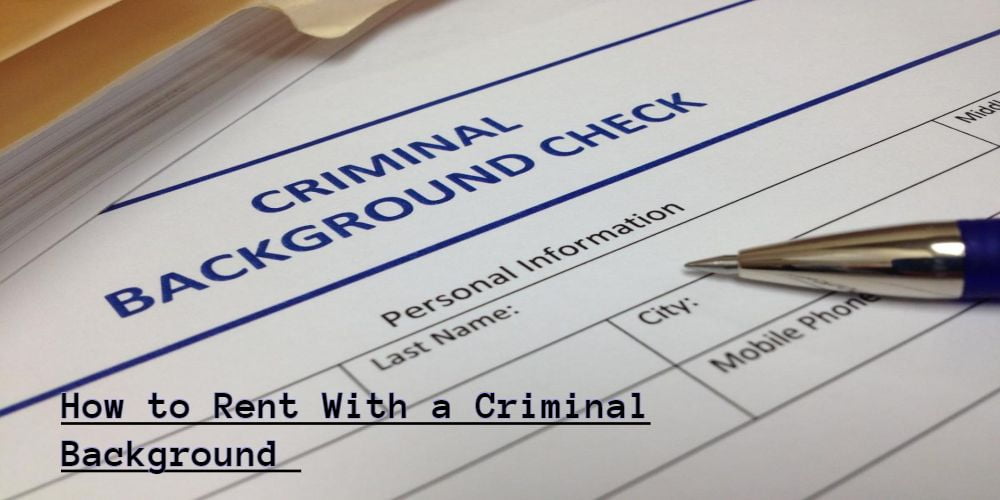Last Updated on October 15, 2021 by Kelvin Nielsen
A criminal record can impact your life heavily. Among many things, it can make people shun you and lower your chances of getting a job. On top of that, finding an apartment to rent with a criminal background can be a daunting task.
You see, before renting their units out, landlords run a background check on prospective tenants. A vital part of this process is checking the criminal background of the tenant in question. If any relevant criminal records show up, the landlord is likely to deny the tenant a chance to rent their apartment.
So, does that mean it’s impossible to rent with a criminal background? Certainly, no. While it can be difficult, you can crack it if you go about it the right way. Here are several ways to rent with a criminal background.
1. Seek out a record expungement.
Also known as record sealing, expungement is the hiding or deletion of a criminal record by a court. When a court is ordered to expunge a record, it is supposed to treat the conviction like it never occurred. This simply means that after a successful expungement, your criminal record will be as clean as a whistle.
However, having a criminal record expunged doesn’t mean you’re forgiven for the offense. While potential landlords might not be able to see them, government agencies will still have access to that record.
Several factors determine whether or not expungement will be granted:
- The nature of the crime. While a jurisdiction may grant expungement for arrests and misdemeanor crimes, it might not for felonies.
- The time that has elapsed since the conviction.
- The effective policies of your jurisdiction. Some jurisdictions dictate that one can only be granted expungement after serving a jail. However, this will depend on the nature of the crime.
- Your criminal history in general.
It’s important to note, though, that not all states allow expungement. For instance, in states like Alaska, Alabama, Massachusetts, Virginia, Florida, Texas, among others, expungement is not a thing.
So, let’s assume you belong to a jurisdiction that doesn’t allow expungement or it’s denied for a certain reason. How do you go about it? There are several other options.
2. Search for apartments that don’t perform background checks.
Some apartments that are located in low-income areas don’t take prospective tenants through screening. You can easily land housing here! However, you might have to prove your financial stability or answer a few screening questions. If you anticipate any discrepancy, find a plan of action in advance or make the landlord an offer. And since finding such apartments can be difficult, you might require the help of local housing authorities or community agencies.
3. Work with a reentry program.
You can find reentry programs in almost all major towns and cities. They are designed to help previously incarcerated citizens reenter society. Among many things, reentry programs can help you find a job, reconnect with society, and find stable housing.
4. Familiarize yourself with income to rent ratio.
While working with reentry programs, you’ll need to be aware of income to rent ratios. Typically, landlords will require your income to be three times the rental amount to consider you a viable tenant. Do research beforehand to know the ratio you expect in the area you’re interested in.
Generally speaking, though, for a unit priced, say, $1,000, the landlord will expect you to make not less than $3,000 in monthly income.
In addition, have documents ready to prove your ability to pay rent. These may include your credit report, pay stubs, pay slips, bank statements, and any other financial document.
5. Have previous landlords vouch for you.
There could be chances that you had rented earlier and had a good relationship with other landlords. If so, list them as references. If they testify to your good conduct, the landlord might decide to rent you.
Besides previous landlords, you can give the reference to your current employer. They will, for one, verify your employment status and give more details about your general conduct. Your friends or people who know you can also come in handy.
6. Offer a larger security deposit.
Offering to pay a bigger amount for a security deposit can ultimately influence a landlord to rent you. Should anything happen, for instance, you go back to jail, they’ll be sure that there’ll be no income loss.
In the same way, you can offer to pay more for rent. This would mean a bigger income for them and no way would they turn down such a deal. However, you might have to prove that you can fulfill the deal. You can do this by:
- Proving you have a steady income. Show them copies of your pay stubs or bank statements.
- Having a guarantor cosign the lease.
While it’s not easy as a pie, renting with a criminal background isn’t exactly impossible. The best option you have is to go for an expungement. If this works, then you may have nothing much to worry about. However, if they don’t grant it, no need to fret as there are a ton of other ways to go about it.

Hi, I’m Kelvin Nielsen, an experienced landlord and accomplished real estate lawyer. My focus is on answering your questions about renting in the hopes of making your life as a renter or a landlord a bit easier.







